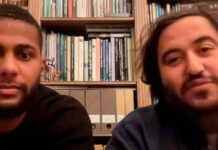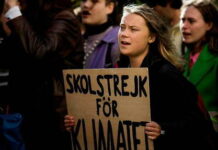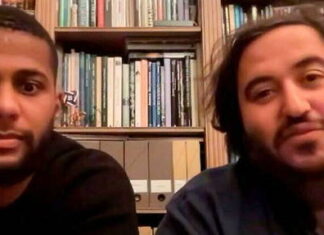He was chosen to close the big meeting bringing together the extreme right and nationalists from around the world, which was held on May 19 and 20 in Hungary. At the podium of the CPAC Budapest (for Conservative Political Action Conference), Jordan Bardella succeeded Hungarian Prime Minister Viktor Orban, Donald Trump, who had recorded a video message, Candace Owens, the best-known conservative influencer in America, to deputies from the Belgian Vlaams Belang, to Brothers from Italy, to Spaniards from Vox… When most of the speakers focused their speeches on gender issues and the threat posed to our societies by the LGBT”, the young French leader, 26, decided to talk about immigration, a recurring theme within the RN, but also ecology, birth rate and new technologies. A remarked speech for the youngest of the CPAC, which he wrote himself on the plane which took him to Budapest, he wishes to specify. A few minutes after this great oral, we find him in the VIP lounge of the congress. He delivers his vision on the future in Europe and America, of the “patriotic camp” and calls for a recomposition within the European Parliament, where Fidesz, the party of Viktor Orban, broke with the big right-wing party , the EPP.
The Point: The main American conservative lobby CPAC has chosen Budapest for its first European conference. Do you think Hungary has become a model for right-wing nationalists around the world?
Jordan Bardella: The question is not to look for a role model. It is a question of reflecting on what has been done in each other. Personally, I particularly admire the birth rate policy put in place by Viktor Orban. Hungary is in demographic deficit, should it resort to immigration or try to conceive on its territory the workers of tomorrow? She opted for a fairly offensive pro-natalist policy, with tax incentives and state support. We can take inspiration from it in France. This is why this kind of international meetings are essential. All parties represented, regardless of their differences, share a common ground: the desire to protect the identity of their peoples. There is here an attachment to the idea of borders. Our adversaries, in all our countries, are alike. They are ultraliberals, followers of deregulation, of ever stronger transfers of sovereignty in favor of international organizations. I share with the Hungarian and Polish governments the idea of reorganizing European construction around the concept of free, sovereign and independent nations in the face of a European Commission, which is, under certain aspects, totalitarian and interferes in the life of States, sometimes against the opinion of the people. We want to put this organization aside to bring out an à la carte Europe.
In your speech, you mentioned themes that had not been addressed so far (ecology, digital society), but you did not mention the main threats identified by the other participants: the woke ideology and the questions of gender. To each their own battles?
I could also have talked about the woke ideology, but I wanted to open up on the subjects that the sovereignist camp, the patriot camp, must also appropriate. The left does not have a monopoly on ecology, the ultraliberals do not have a monopoly on new technologies and the digital society. We are all sovereignists here, it’s normal that there are some differences between us, it’s no secret. Some have more conservative societal positions than us. But that’s because they come from more conservative societies.
You are a Member of the European Parliament. Viktor Orban’s Fidesz recently left the large right-wing group, the EPP. What link does the Rassemblement national have with Fidesz? Is a merger possible?
Over the 2019-2024 term, I note that the lines have evolved considerably. I took advantage of this summit in Budapest to meet the Hungarian Minister of Justice, Judit Varga, as well as the head of the Fidesz delegation to the European Parliament. We share the same vision of what Europe should be. In the long term – I hope for the European elections of 2024 – there should be a single sovereignist group in the European Parliament, in order to weigh more strongly than with our 70 ID deputies [Group “Identity and Democracy”, to which the RN belongs, editor’s note ], the ECR deputies and the Fidesz deputies who have now left the EPP. 2022 marked the recomposition of the political divide in France. 2024 must act the recomposition in Europe. We are in discussions, we see each other, we discuss, we even work together in certain committees in Parliament. America elected Trump, the UK had Brexit and Europe is moving in the right direction. Fidesz in Hungary, the PiS in Poland, Vox in Spain, La Ligue in Italy, us in France… Things are moving. We are no longer in the Europe of François Hollande, Matteo Renzi and Angela Merkel.
What are your ties to the US Republican Party?
We inevitably feel closer to the European sovereignists with whom we share a common political space. But we are also in contact with American parliamentarians and we sent a delegation to CPAC in Orlando a few months ago. We believe that Trump’s election, Brexit, the new deal in Hungary and Poland, all of this is a sign of a people’s awakening. Throughout history, France has often set an example with its revolutions. Maybe she will close this phase? We’ll get there eventually.
Will we soon see a CPAC summit in Paris?
Wait, this is my first time at a CPAC. I make contacts and exchange ideas. We are preparing the world of tomorrow and the patriot camp, in the very broad sense, of tomorrow.
It is said that Marine Le Pen was to go to this CPAC in Budapest. A Facebook post announcing it was published and then deleted. What do you know?
I was forwarded the invitation. Marine Le Pen is busy: unlike me, she is a candidate in the legislative elections. She is right now in her riding. I assume the role of ambassador of the movement, of its project in events like this.


















